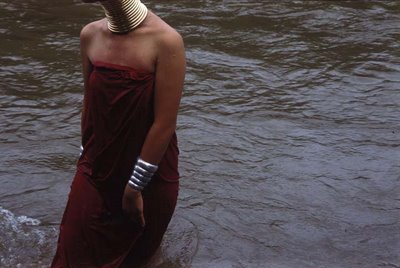
Padaung men do not seem to work at the Mae Hong Son refugee camp thats situated on the Thai Myanmar border. The "longneck" women run stalls and sell souvenirs to tourists who come by to take photographs of the women and their necks. We (Eric and I)had come to the village to shoot a short film on the same for National Geographic Television.
The Padaung, along with other Karen groups fled to Thailand from the genocidal acts of Myanmar's dictatorial military regime. In the dense forests that separate Burma and Thailand, rebel factions fight a bloody guerilla war with the Burmese government and stories of genocide, rapes and extra judicial executions are common amongst the Karen refugees.




It was hot. The stall run by Maja and her sister Mana, sold chilled iced tea They were talkative. Maja spoke 5 languages besides Burmese. She spoke Spanish, Italian, German, English and French. She told me that she had picked it up from tourists. Mana went to school and was a mean leg wrestler.
“Its awful what they do to their necks,” said a large breasted American tourist “Only the women… why cant the men wear them”
“Do these women have a choice? It’s just like the Moslem women,” said an Israeli lady with pierced eyebrows.
“They’re a wonderful people…and they look just beautiful, and you work for the national geographic...lovely!” said the older Canadian lady with too much make up. They posed. Click. I said I would mail them the picture.

Maja stood by while the tourists answered the questions on camera and looked annoyed. Later she said that she liked her neck rings. Also, women with more neck rings got more people coming to their stalls and sold more souvenirs. I asked her what she would do if she could leave the refugee camp and move to the city. Would she wear her neck rings there? She laughed and didn't reply. I asked her about the lonely planet "human zoo" comment and she looked upset. I bought her an iced tea.
She drank deeply and in between sips spoke to me.
“We are refugees but I'd rather make money than live of the Thai government. If people want to take pictures of my neck then let them but they should buy souvenirs from my stall”.
Everyone gets a piece of the pie. The Padaung, Thai businessmen, the Thai government, and as rumor has it, a Karen rebel group.
Over the next few days we chatted and drank many iced teas. Maja could not leave the camp and when conversation ebbed she looked out over the fields and was lost in thought. I asked her about Burma. She told me about the walks through swamps and minefields, the ones that did not make it, the little war which the world wasnt interested in. From the refugee camp we could see the hills that seperated Burma and Thailand. Distant, dark and forested they stretched out into the mists.
Over the day that passed we shot people changing their neck rings (their necks did not flop over and break), met with people from all over the world who came by to take pictures, learned about the purchasing habits of people from around the world (Indians don’t buy anything, the Japanese buy everything), bought souvenirs and got thrashed at leg wrestling by Mana.
We took stylistic shots of their necks. Maja and some other girls posed patiently.
In the evening we would say goodbye and leave the camp. The refugees were not allowed to leave. They ate and dressed well with proceeds from the stalls. We would head to our hotel. The Padaung remained.

Some days I think of Maja and Mana and what endures is an image of Maja looking unfocussed into the distance, in her quiet time, away from the cameras. She was bored and had said so. With all their talents and intelligence, Maja and Mana are refugees who live in a camp in a foreign country. They cannnot pursue jobs or careers. They sell souvenirs.
The reason regarding why neck rings came into being are several according to the Padaung. To differenciate their women from other tribes, as a mark of beauty, to make them unattractive to marauders and slave traders. Today at Mae Hong Son, they help sell souvenirs and keep the refugees afloat economically. Like the memory of wars and brutalities, the tradition will dissapear one day, when cities draw closer and regimes change. Until then Maja will sell souvenirs and chat with tourists.

A request : If anyone reads this blog who will be headed to Mae Hong Son, can you please give Maja and Mana some of these photos. Email me and I will email you images to print and give them. I have already sent them some but have not heard from them which means the pics haven't reached them. I would appreciate it. Thanks








0 comments:
Post a Comment